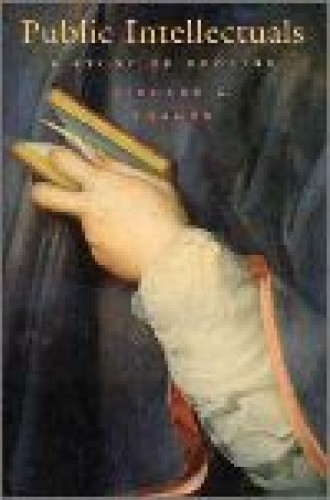Thrashing the pundits
Near the end of Public Intellectuals, Richard Posner observes that Richard Nixon was forced from office in 1974 “because people were outraged.” This was perhaps the public’s most dramatic gesture of the second half of the 20th century. But the people Posner defines as public intellectuals would never have understood this, since his public intellectuals concern themselves only with public policy—not with public philosophy, public ethics or public theology, and not with matters of moral and spiritual outrage.
This view is not unique to Posner. Almost all public intellectuals today would agree that they should focus on hard-headed policy questions rather than soft-headed value questions. Such public intellectuals would attend, for example, to the politics and the legalities surrounding Nixon’s impeachment and resignation, but not to how his behavior undermined the nation’s moral and spiritual stature.
Posner underscores his position by using, without irony, an 1891 comment by British scientist William Thomson (Lord Kelvin) as an epigraph: “When you can measure what you are speaking about and express it in numbers, you know something about it; but when you cannot measure it, when you cannot express it in numbers, your knowledge is of a meagre and unsatisfactory kind.” Such a judgment of what counts as “knowledge” puts on the sidelines such great figures of American public life as Jane Addams, Walter Rauschenbusch, Walter Lippmann, Dorothy Day, John Dewey, Reinhold Niebuhr, Sidney Hook and Christopher Lasch. Many critics of the contemporary scene would argue that it is precisely these kinds of figures that we lack today—public intellectuals who can write with clarity and moral passion about public issues—and that their absence is a sign of the decline of public intellectuals. Posner sees a decline, but it has to do not with intellectuals’ loss of scope and ambition but with their factual inaccuracy.
Posner is himself a remarkable public intellectual. He is a senior lecturer at the University of Chicago Law School and chief judge of the U.S. Court of Appeals for the Seventh Circuit. By 1995, he was already the most prolific writer in the American judiciary, cited 20 times by the Supreme Court and 200 times by appeals courts, and he was the author or editor of 21 books. (Ten more have been published in the past six years.)
Posner’s narrow definition of the public intellectual is his book’s greatest weakness and its greatest strength. Using economic analysis, hard data and checks on prediction, Posner subjects dozens of public intellectuals to pointed criticism, if not a sound thrashing. He concentrates on “academic public intellectuals,” arguing that independent public intellectuals are a dying breed, and he demonstrates how their public pronunciamentos have been sloppy and prejudiced in ways they would never allow in their scholarship.
Academic public intellectuals—normally rebuked only privately in a confidential manuscript evaluation or personnel committee report—will feel wronged by this kind of treatment. After all, their public-intellectual writing is, for them, just a sideline. Someone who checks the accuracy of their descriptions or predictions is like the sourpuss at a party who interrupts a heartfelt rumination or a scandalous rumor by remarking that it ignores the facts. Posner deserves credit for putting their feet to the fire. Speaking like an economist, he argues that a public intellectual who goes untracked and unchecked, as most do, is like a business insulated from customer response or government regulation. They know that if, by some strange chance, what they publish as public intellectuals is read and repudiated, they will escape economic punishment because they enjoy a tenured faculty post.
Posner notes that Paul Ehrlich incorrectly predicted Malthusian catastrophes of overpopulation, that Noam Chomsky has twisted politicians’ motives beyond recognition, and that Robert Bork has repeatedly called liberals the catalysts for catastrophic consequences that never occur. He reminds us too that Richard Rorty claimed in 1987 that “time seems on the side of the Soviet Union”; in 1988 that “if there is hope, it lies in the Third World”; and in 1992 that America “could slide into fascism at any time.” These kinds of gaffes, Posner observes, generally go not only unpunished but unnoticed.
However, one wishes Posner had spent more time in the library and less in the courtroom. He discusses at length literary scholar Wayne Booth, and then says Booth is neither a public intellectual nor a literary critic because his criticism is too moral. But the problem here is Posner’s, not Booth’s. Posner should have 1) left Booth out of his book on public intellectuals; or 2) not called him a literary critic; or 3) avoided the obsolete assumption that good literary criticism is about formal, not moral, analysis. He glibly dismisses philosopher Martha Nussbaum’s important epistemological critique of the cultural relativists because, he says, their relativism is not epistemological but only political. He also slights her normative analysis of developmental economists because, he says, their normative assumptions are too modest to bother with.
Posner’s main claim is that the arts and humanities should be kicked out of public intellectualdom. But it is he who singles them out for lengthy consideration—at least long enough to announce that they have no business being there.
Finally, Posner launches into an ill-fated and lengthy exercise in ranking the 571 public intellectuals who in the years 1995-2000 received the most media attention and Web-site hits. None of the great public intellectuals I cite above (from Addams to Lasch) makes Posner’s top 100, and three fail to show up among his top 571. Not only is this ranking a ridiculous way to assess real public influence, it undermines Posner’s own project; he himself would predict that the ranking would stimulate public intellectuals’ vanity, causing them either to preen or be wounded and then to ignore the book’s larger argument.
Nevertheless, Posner has named names, and has called logical inconsistencies and factual errors what they are. He properly criticizes “limousine liberals,” who fret about oppression and live luxuriously, and “Grand Inquisitor Conservatives,” who want others to be religious, but not themselves.
However, Posner misses the deeper dimension of the intellectual’s vocation. From Aristotle to Aquinas, to Reinhold Niebuhr, to humorist Dave Barry, any theologian, ethicist, philosopher or social critic must presuppose a picture of the world, of the totality of things. John Dewey called this a “sense of an extensive and underlying whole.” No one really knows, Dewey said, what to make of any particular activity unless he or she sees its role in a larger activity, the largest of which is the activity of the universe. Dewey tied this world-picture to generic religion and its claim to truth. While many may choke even on Dewey’s modest metaphysical language, it explains why religion refuses to go away. “Religion” is the generic name for seeing the world through the widest possible lens, as that world is affected by a live, but not necessarily supernatural, presence that makes the world more than just so much matter in motion.
Posner, too, has a worldview, even if he hides it. It is implicit in his decision to use the epigraph from Lord Kelvin and in his urge to rank public intellectuals by counting citations and Web-site hits and then to graph and formularize his findings. Posner’s professed intent is not to trash public intellectuals but to show—“through definition and description, the application of social scientific theory, and the use of statistics—that the public intellectual can be studied in a systematic and fruitful fashion.” But Posner’s predilection is not merely methodological. As theologian Henry Nelson Wieman once said, one’s method for picking up a cat had better be informed by an understanding of what a cat is: it is aggressive and clawed and will attack those who lift it the wrong way.
When Posner uses social-scientific and even economic methods to study public intellectuals, he assumes that public intellectuals are creatures who can be grasped by such methods. He is a scientific (positivistic) empiricist, wanting only sensory evidence (how many Web hits?), not a subtle (radical) empiricist wanting qualitative evidence (what affections are stimulated?). For Posner, qualitative evidence is too fuzzy.
This viewpoint allows Posner to ignore the subtler phenomena exposed by public philosophy, and it prompts him to pursue questions of politics and ideology only “when the religious dimensions of such questions, being undiscussable, are set to one side.” He encourages the notion that civilization can be taken straight, without poisonous additives. He argues, for example, that “society can be civilized without being religious, puritanical, intolerant, nostalgic, elitist, and censorious.”
This bias underlies Posner’s simplistic argument that Christianity is either about facts or it is fairy tale—an argument better suited to a barroom than to a book published by Harvard University Press. “Deprived of the authority to assert as fact that God created the universe and man, that Jesus Christ did not have a mortal father and that human beings have souls that outlive the death of the body, Christianity becomes a myth, a fairy tale; its moral precepts, rituals, and clergy become the doctrines, the customs, and the managers of a fraternity or other social club.” Posner loves experts as well as evidence, but when he makes religion either fact or fantasy (and nothing else), he ignores the experts to be found a mere 200 yards from his law school—the faculty of the Divinity School of the University of Chicago, which, has never accepted such an either-or distinction.
Posner calls himself a pragmatist; he is and he is not. Posner’s diatribe is pragmatic when it insists that public intellectuals be assessed for their public effectiveness, when it ridicules public intellectuals who are ineffectual, and when it criticizes public intellectuals who mislead the public. But Posner is not a pragmatist when he disregards public intellectuals who discuss public philosophies and attitudes. These public intellectuals sometimes uncover implicit orientations and worldviews that, in turn, affect public decisions and actions. For example, he ignores the fact that there is an American spiritual culture, that religious thinkers can criticize and affect that spiritual culture, and that they can thereby make a difference in American public practice. Religious critics such as Cornel West, Jean Bethke Elshtain and Richard John Neuhaus are doing as much today.
Posner not only inhabits a kingdom of the spiritually blind, but he exiles all those who might be one-eyed kings. For Posner’s pragmatism, America is a land of facts. He lacks the nuance found in classical pragmatists such as William James, John Dewey and Henry Nelson Wieman. These were science-loving public intellectuals whose world included both facts and values. Posner warps pragmatism, taking a philosophy designed to honor intangible things while holding onto tangible things and bending it into a philosophy that honors tangible things and lets intangible things go. Posner has, in short, no way to understand why the public was righteously indignant with Nixon. And no way to understand moral and spiritual action in a society with a spiritual culture.






